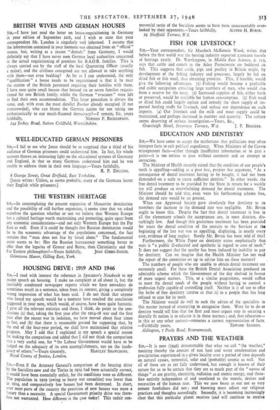EDUCATION AND DENTISTRY
Sta,—We have come to accept the misfortune that politicians may often interpret facts to suit political expediency. When Ministers of the Crown misrepresent facts—either through insufficient information or to gain a point—it is too serious to pass without comment and an attempt at correction.
The Minister of Health recently stated that the condition of our people's teeth is appalling—adding as a post hoc, propter hoc argument, " As a
consequence of dental treatment having to be bought, it had not been
demanded on a scale to create sufficient dentists." In other words, the free dental treatment to be provided by the State in return for a weekly
tax will produce an overwhelming demand for dental treatment. The Minister should be told that, even were his forthcoming scheme free, the demand rate would be no greater.
When one Approved Society gave absolutely free dentistry to its members the increase in the demand rate was negligible. Mr. Bevan ought to know this. Despite the fact that dental treatment is free in all the elementary schools the acceptances are, in most districts, dis- turbingly low. And though this gratuitous treatment has been provided for years the dental condition of the recruits to the Services at the beginning of the last war was as appalling, displaying, in nearly every case, evidence of long neglect. Surely Mr. Bevan has been told of this! Furthermore, the White Paper on dentistry states emphatically that ours is " a public ill-educated and apathetic in regard to care of teeth."
It does not suggest that the apathy has been induced by inability to pay for dentistry. Can we imagine that the Health Minister has not read the report of the committee set up to advise him on these matters?
The numbers of people who are unable to obtain dental treatment are extremely small. For these the British Dental Association produced an admirable scheme which the Government of the day shelved in favour of more urgent matters. This, or a similar programme, would suffice to meet the dental needs of the people without having to control a profession fully capable of controlling itself. Neither is it of use to offer the bribe of free dentistry (untrue as that is) to a people that has long refused to care for its teeth.
The Minister would do well to seek the advice of the specialists in this matter instead of attempting to antagonise them. Were he to do so dentists would tell him that the first and most urgent step in securing a dentally fit nation is to educate it in these matters ; and, that education— in this or any other context—connotes a correct representation of facts,
—Faithfully yours, EDWARD SAMSON. Aldington, 7 Poole Road, Bournemouth.


























 Previous page
Previous page